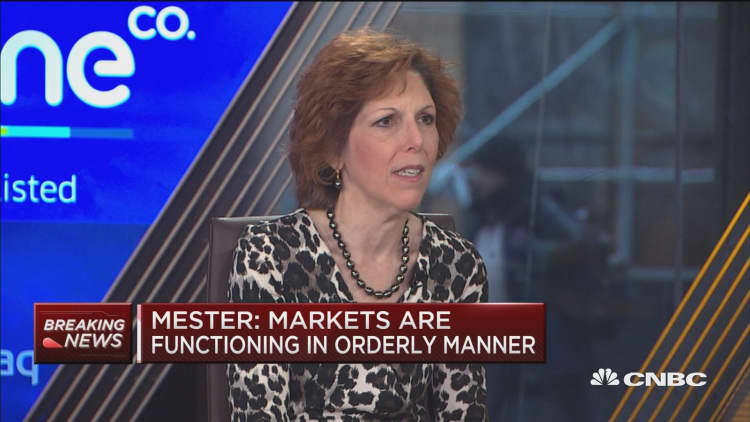
Cleveland Federal Reserve President Loretta Mester said Friday this month's market turmoil is a "risk" to the economic outlook, but it's not changing her mind on growth at this point.
"This is a natural thing that's going on in the market," Mester said in an interview with CNBC's "Squawk Box." "Of course it gets your attention, we monitor it, but right now I think of it as a risk to the outlook."
Mester, who assumed her role in 2014, also expects GDP to slow "a bit" in 2019. "We're still going to be above growth trend in my forecast," she added.
Mester, a voting member this year on the central bank's policymaking committee, appeared on CNBC at a time of intense stock market turmoil and concerns about the path higher for interest rates.
Stocks futures were indicating a lower Wall Street open on Friday, potentially undoing most of the strong gains seen on Thursday. With Friday's indicated declines, the was on the cusp of a correction. The Nasdaq is all but certain to post its fourth straight weekly loss.
On Wednesday, Mester said at an economic event in New York she has not adjusted her expectation of a gradual rise in rates. She said a "prolonged" market drop could be a "risk to the outlook" of the economy, but she sees no signs thus far of pinched credit or a pending recession.
Earlier this month, the markets started going haywire after Fed Chair Jerome Powell said rates are a long way from so-called neutral, a level neither accommodative nor restrictive to the economy.
Ever since, President Donald Trump has repeatedly slammed Powell and the Fed, saying there's no need to continue to increase rates because the stronger economy is not causing problematic inflation.
In the CNBC interview, Mester said Fed officials try "to be very careful with our communication" and try to give the public "what we think of where we're going with policy."
Mester added that central bankers consider whether rate hikes are based on economic data, stressing the "neutral rate" is a moving target and can vary over time.
The Fed has raised rates three times this year to a range of 2 percent to 2.25 percent, with another 0.25 percent hike expected in December.
— Reuters contributed to this report.


